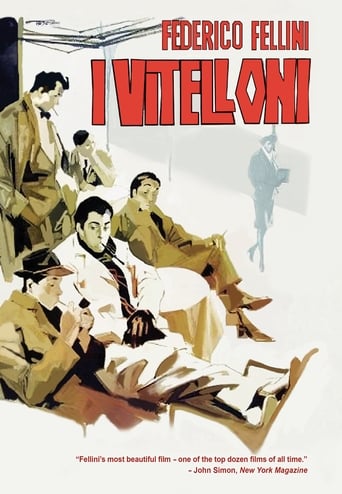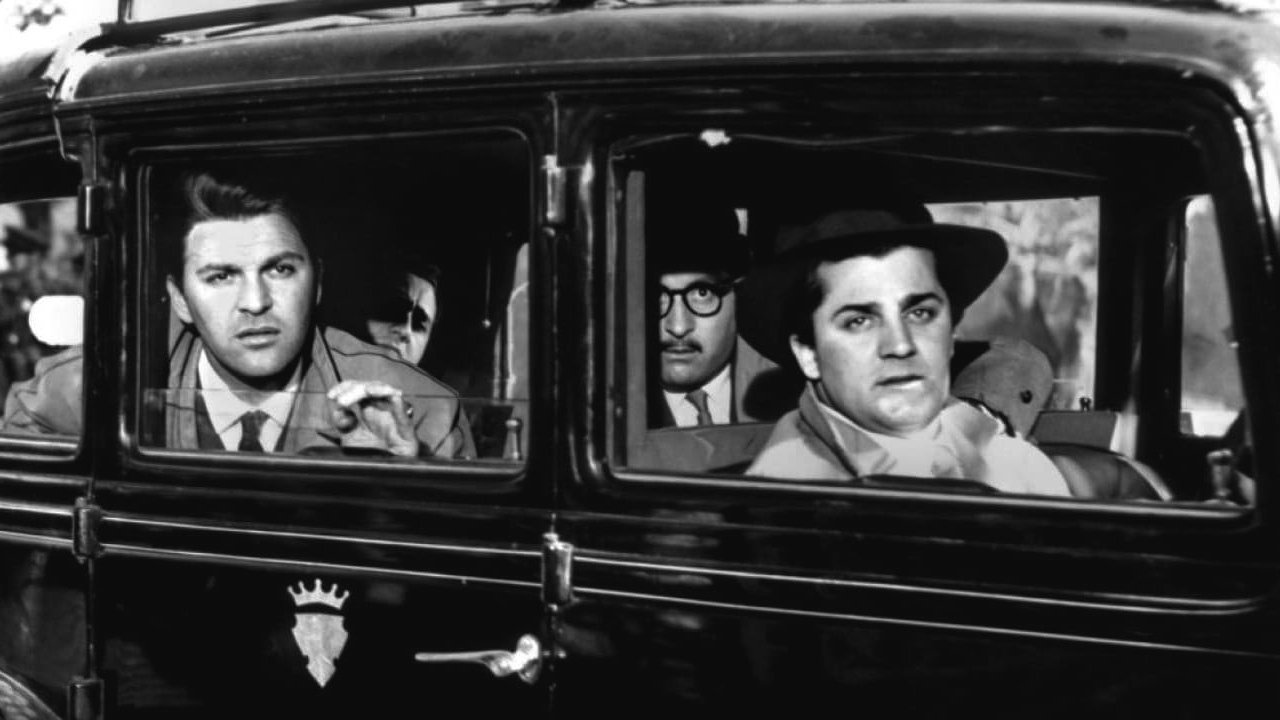PassPopcorn
I Vitelloni is one of the lesser known movies by the world famous Italian filmmaker Federico Fellini. And even though it's not well-known, apparently it is Stanley Kubrick's favourite movie of all time, and is also praised by Martin Scorsese and George Lucas. Also, in my opinion, it should definitely be seen by movie- and Fellini-lovers alike, along with the famed 8 1/2 and La Dolce Vita – and especially if you're not very fond of Fellini's excursus in pure comedy, like in Lo Sceicco Bianco. I Vitelloni is a classic Fellini drama: there are a few good laughs, but melancholia is a constant and the ending is not exactly a happy one.I Vitelloni follows five friends – Moraldo (Franco Interlenghi), Alberto (Alberto Sordi), Fausto (Franco Fabrizi), Leopoldo (Leopoldo Trieste) and Riccardo (Riccardo Fellini) – who are in their thirties but haven't done anything with their lives and don't even have jobs, so they spend their days and nights fooling around and wasting time. When Fausto is forced to marry Sandra (Leonora Ruffo), because he impregnated her, the others – and especially Alberto – start questioning their existence and their future, while going on with their everyday lives: Leopoldo tries to write a good play, Alberto gets drunk and depressed, Fausto cheats on his wife and Moraldo, the quiet one, observes and narrates the story for the audience."Vitelloni" is a term that was used among young people living in Pescara – the city where Ennio Flaiano, one of the screenwriters, was born – to indicate other young people who spent their days doing nothing, mostly because it was very difficult to find a job in the post-WWII period (which is when the movie is set, too). It was also a very risky investment: Fellini's previous film, The While Sheik, had flopped, and he decided to cast Alberto Sordi, whom the audience didn't like. Still, the movie was well received and won some important Italian prizes, and it was Fellini's first movie with international distribution. All of this, I think, was well deserved. I Vitelloni focuses mainly on atmosphere: it starts happily, at the end of the summer. However, the main characters soon start complaining, because there's nothing to do in their small town during the winter, and their negativity projects outside, on Fausto, who is forced into a marriage he doesn't want. Also, everyone talks and thinks about leaving, but nobody does.The thematic and the atmosphere give a constant feeling of melancholia, and every fun activity of the vitelloni is interrupted by something bad: for example, Alberto chases a dog on the beach and discovers that his sister is seeing someone he doesn't like, again. All the actors are very good and likable in their roles, but I think Sordi really stands out, as he manages to portray a seemingly carefree man who acts like a fool most of the time, but is actually very sensitive and troubled. It is also great seeing the contrast between the young and the old: the vitelloni don't want to become serious adults, because all the adults in the movie are negative and lead boring lives. Ultimately, the vitelloni find it hard to abandon the gang, after so much time they've spent together. All in all, this is a great movie about serious growing up that will make you remember the days of youth and untroubled fun, and while nostalgic, you'll also clearly realise why it's so important to, eventually, leave all of that behind.Rating: 8/10 Read more at http://passpopcorn.com/
Greekguy
In May 2012, the New Beverly Cinema in Los Angeles played a series of double-feature evenings, each time pairing Fellini's 'I Vitelloni' with a film from a director who had made it clear that this 1953 Fellini film had been a formative influence on his work. The film was shown first in tandem with Martin Scorsese's Mean Streets, then with George Lucas' 'American Graffiti', and lastly with Barry Levinson's 'Diner', in what was a fitting tribute not only to the influence that 'I Vitelloni' has had but also to its ability to meet even the highest of comparative standards.The story of this film is simple enough – the audience follows a group of five young men, all of whom are friends, through the off-season in their hometown, a small seaside city in Italy. The narrative focuses on the leader of the group, Fausto, and his relationship with Sandra, the sister of his friend Moraldo. Of course, the state of this relationship, and the changes it undergoes, will also have an important impact on the group as a whole, and on Moraldo's relationship with Fausto in particular.A number of Fellini fans have not warmed to this film – it seems perhaps too tame for them. Certainly, it is less theatrical than 'The White Sheik', the film Fellini made one year earlier, but then again, although there is still pageantry and magical illusion, particularly in the carnival segment, this film is not about actors or films. Instead, it's about youth, and male youth in particular. Contemporary viewers sometimes comment that this, too, is a bit difficult to accept, since the young men personifying that youth are around thirty, but that is only a question of cultural semantics – for this society, i.e., Italy in the early 1950s, the state of youth continued until marriage, or until one left home and struck out on one's own. The central characters of this film are thus 'youthful' in that they live at home, on borrowed money. They cannot find work, or they cannot keep work. They dream, but lazily, without urgency.What makes the film wonderful, however, is not their laziness but the truthfulness in their stories. This is not a 'slacker' film, except perhaps in roughly the way that 'Hamlet' is a slacker play. No, this is a film about the comfort and the discomfort of friendship, the sting and the sweetness of love and the painful transition to adulthood. The actors do a wonderful job, the location is as authentic and provincial as it can be, and the camera and the music work in perfect partnership. Indeed, in a film that has a good deal to say about how important we each are to one another, it is fitting that its internal elements all coalesce so smoothly.
TheLittleSongbird
An early Fellini and a wonderful one at that. While it is not my favourite Fellini(my top 5 being Nights of Cabiria, La Dolce Vita, 8 1/2, Amarcord and La Strada), it is one of his best and sadly one of his more neglected works. The film does look gorgeous, with rapid yet fluid cinematography and beautiful scenery. Nino Rota's score brings great pathos to every scene it appears in, the script is funny, tense and moving and while familiar in a way the story is engaging. The character studies are just as impressive, these are distinct characters that you do care for. You don't perhaps quite identify with them in the way you do with the titular characters of La Strada and especially Nights of Cabiria, but they are not as detached as some of Fellini's later films like Casanova or Satyricon(my least favourite Fellini but still has its interest points). Fellini's direction is restrained yet quirky and charming, the complete opposite of self-indulgent or dull like him and some of his later films have been criticised for being. The acting is very good indeed, Franco Fabrizi as Fausto especially is superb. All in all, a wonderful film and one of Fellini's better films while not quite among my absolute favourites from him. 9/10 Bethany Cox
christopher-underwood
A marvellous, involving and moving, swirling, humane and believable look at life an Italian seaside town. At first when we are introduced to the bunch of 'young' men, I thought that, as with US and UK films of the period, we were having to accept 30 year olds as 20 year olds. But no! These layabouts, loafing about, picking up girls and older women, are 30 year olds still living with their mamas and expecting everything to fall into their laps (and their lips!). Getting pregnant still a big deal, of course, and if the 'youngsters' think little of the consequences the older generation certainly seem to get together to get some sort of result. There are many wonderful sequences in this, ever beautiful tapestry of life in the 50s and the director even manages to get in plenty of carnival in this early film.


 AD
AD




